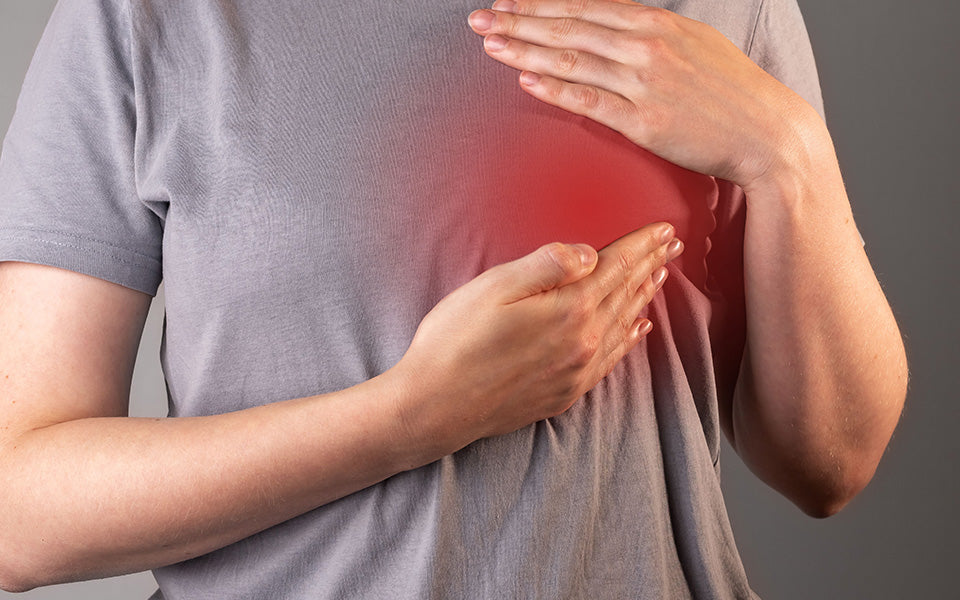Experiencing discomfort in your breast upon pressure can be concerning, and it may trigger thoughts of serious health issues. Fortunately, the majority of breast pain is caused by normal hormonal changes or minor treatable conditions. Breast pain is typically not an indication of breast cancer, which is reassuring.

However, it is crucial to determine the underlying cause of the pain when pressure is applied to your breasts, and
it should not be ignored. This article will explore the common reasons for breast pain, also referred to as
mastalgia and mastodynia, their causes, and when it is necessary to seek medical attention.

Hormone shifts
The body undergoes a monthly series of hormone changes that coincide with the menstrual cycle. These changes aim to prepare the body for pregnancy and to eliminate any unnecessary tissue if conception does not occur. These hormone shifts may also lead to breast pain and sensitivity, a condition called cyclic mastalgia or fibrocystic changes.

Approximately 50 percent of women above the age of 30 experience this condition. Prior to the onset of the menstrual
cycle, the breasts may be particularly sensitive to pressure or painful, and may feel swollen and heavy, with
tenderness in the armpit region. If these symptoms are present and the period is due soon, cyclic mastalgia is a
probable cause.

Mastitis
Mastitis is a condition characterized by an infection of the breast tissue. It is prevalent among breastfeeding women and can arise due to either a blocked milk duct or bacterial infection within the duct. Symptoms of mastitis can include pain, swelling, redness, itching, and a feeling of warmth in the breast area.

Additionally, a fever may accompany the infection. Typically, only one breast is affected by these symptoms at a
time.
Mastitis has the potential to develop into more severe complications, such as a breast abscess, and frequently
necessitates medical intervention to be properly treated.

Medications
Breast pain can be a potential side effect of some prescription medications. Some of these medications are associated with hormonal changes, which may result in breast pain due to inflamed breast tissue. Others are used to manage heart and cardiovascular disorders, which can lead to breast pain originating from the chest wall. There are various medications that can cause breast and chest pain as a side effect.

These include spironolactone, which is prescribed for hypertension and cardiovascular disease, methyldopa, another
medication for hypertension, digoxin/digitalis, which can be used to treat congestive heart failure, diuretics,
designed to increase urine output and excrete water and salt from the body, and hormonal birth control pills.

Breast cysts
Breast cysts refer to fluid-filled sacs that can develop in the breast tissue. They can vary in size, with some being small and others being large. Additionally, they can increase or decrease in size during the menstrual cycle.
Breast cysts are highly prevalent, with estimates suggesting that between 70 and 90 percent of individuals identified as female at birth will experience a breast cyst at some point in their lives. Breast cysts can elicit tenderness when subjected to pressure, and they may also have a smooth, round texture. Although most breast cysts are benign, a few may necessitate removal.

Breast abscesses
A breast abscess indicates an infection within the breast tissue, and it can arise as a complication of mastitis or occur in individuals who aren't nursing. Approximately 5 to 11 percent of women who experience mastitis while breastfeeding are likely to develop a breast abscess.
In case you're not breastfeeding, the factors that increase your likelihood of developing a breast abscess may involve being under or overweight for your height, or having pierced nipples. Moreover, African American individuals may have an elevated risk of developing a breast abscess.

Breast tumors
Tumors in the breast can either be cancerous or benign. The majority of changes occurring in breast tissue are typically benign, with only about 3 to 6 percent of cases being cancerous. Moreover, it is essential to note that breast pain rarely indicates a cancerous tumor.

One type of benign tumor is fibroadenomas, which affect around 25 percent of people assigned female at birth.
Although
they are usually painless, you can feel them move through your breast tissue when you apply pressure. Cancerous
breast
tumors can cause discomfort, particularly if they are inflammatory.
Inflammatory breast cancer, which is an aggressive type of breast cancer, is quite rare, accounting for roughly 1 to 5 percent of breast cancer diagnoses, according to the American Cancer Society. Some of the other symptoms of inflammatory breast cancer include redness, swelling, and tenderness.

Breast injuries
Just like any other part of your body, your breasts can also get injured or bruised. If you notice redness, swelling, or a change in skin color on your breast, it may be an indication that you are healing from an injury caused by a fall, accident or a sports-related activity. In addition, breast soreness can also occur due to the workout of chest muscles. This can be due to the use of heavy weights or improper posture during exercise, leading to strain on the muscles in the chest area.

Talk with a doctor
Although most causes of breast pain are not alarming and do not require treatment, it is important to seek medical attention if the pain persists. If you experience constant and intense pain in one or both of your breasts, redness or swelling that doesn't improve after a day or two, or any signs of infection like fever or colored drainage while breastfeeding, it is advisable to consult with a doctor.

It's also important to see a doctor if you detect a lump in your breast. Waiting for the pain to disappear on its
own is
not recommended, and seeking medical attention can help diagnose any underlying conditions that may require
treatment.

Takeaway
Breast pain is a prevalent symptom, and it is often caused by something benign or common, such as hormonal changes, cysts, or minor injuries that do not require medical attention. However, it is important to investigate the cause of breast pain, even if it is a common occurrence. Although rare, breast pain can be a symptom of cancer. Therefore, it is crucial to consult a doctor if you are experiencing any discomfort or other symptoms related to your breasts.
































Leave a comment
This site is protected by hCaptcha and the hCaptcha Privacy Policy and Terms of Service apply.